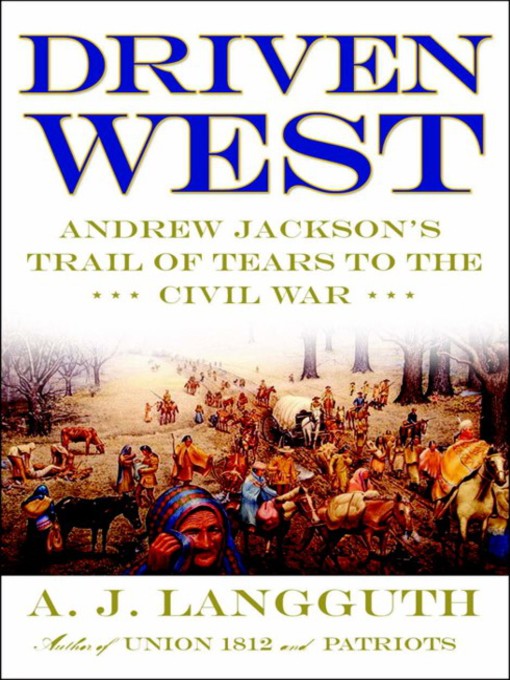As president, Andrew Jackson decreed that the Indians of Georgia be forcibly removed to make way for the exploding white population. His policy set off angry debate in the Senate among such giants as Henry Clay, John Calhoun, and Daniel Webster, and protests from writers in the north like Ralph Waldo Emerson, who represented the growing abolitionist movement. Southern slave owners understood that those protests would not stop with defending a few Indian tribes.
-
Creators
-
Publisher
-
Release date
November 24, 2010 -
Formats
-
OverDrive Listen audiobook
- ISBN: 9781400198498
- File size: 428229 KB
- Duration: 14:52:08
-
-
Languages
- English
-
Reviews
-
AudioFile Magazine
With the end of the War of 1812, the United States finally resolved its independence from the British and underwent an amazing transformation. The nation expanded westward, and, with the removal of the Cherokee to what is now Oklahoma, set in motion, according to the author, the events that would lead to the Civil War. Narrator Mel Foster gives a suitably strong reading of this compelling story. His baritone ably gives credible voices to such disparate characters as Andrew Jackson, Henry Clay, Martin Van Buren, and Cherokee leader John Ross (to name but a few), each with a distinct voice and appropriate accent. He delivers narrative sections with the same care and skill, keeping the listener's interest and moving the story at a pace that is easy to follow. M.T.F. (c) AudioFile 2011, Portland, Maine -
Publisher's Weekly
September 20, 2010
USC professor of journalism Langguth (Union, 1812) maintains America's first civil war occurred during the 1830s when Andrew Jackson expelled Indian tribes from the Deep South. Recounting the events from 1825 through the Civil War (which forced the Cherokees to choose between North and South), he puts in context the expulsion of the Cherokees from the South and their tragic Trail of Tears. Langguth proceeds through chapters that each focus on one figure in the drama, from John Calhoun to Cherokee chief John Ross. By 1820, wars and draconian peace treaties had already eliminated many Indians from the South. Exhorted by Southern white leaders to move to Oklahoma territory, some complied, but many refused; some became Christian. The end came when Andrew Jackson overcame Northern opposition to the 1830 Indian Removal Act. The army ejected reluctant Indians and with little planning for the long trip, 25%–50% percent of the 50,000 deportees died of disease and starvation. Readers of this engrossing, profoundly depressing history may not consider the fight over Indian removal civil war, but few will doubt that it represents a bitter North–South conflict in which the bad guys won. B&w photos.
-
Loading
Why is availability limited?
×Availability can change throughout the month based on the library's budget. You can still place a hold on the title, and your hold will be automatically filled as soon as the title is available again.
The Kindle Book format for this title is not supported on:
×Read-along ebook
×The OverDrive Read format of this ebook has professional narration that plays while you read in your browser. Learn more here.


